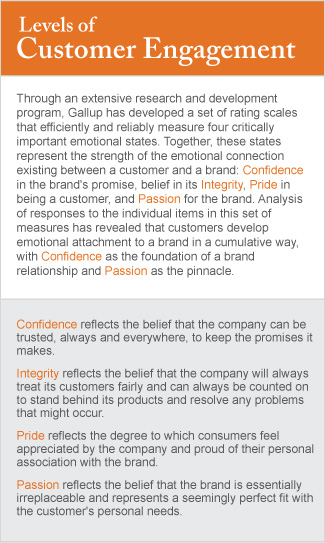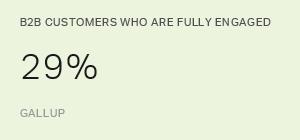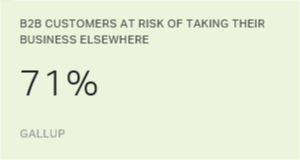Many business-to-business (B2B) companies think that if they sell their products or services at the lowest price, they win. That approach may work until a competitor initiates a price war or comes up with a new product. Then the B2B company is intensely vulnerable, easily replaced, and certain to lose profit.
Offering low prices is a short-term survival tactic, not a strategy for long-term, sustainable growth.
Competing on price is a losing strategy, and Gallup research shows it's an unnecessary one. B2B companies are more likely to be successful and secure in their customer relationships if they help their customers succeed. The more a B2B company helps its customers perform, the more essential it becomes. That kind of customer impact transforms B2B companies from vendors into vital partners.
Creating customer impact
To create customer impact, a B2B company must help its customers improve their performance. The more relevant the improvement, the more successful the partnership between the customer and the B2B company becomes, because the relationship shifts from one of price to one of advice. To begin the shift to an advice-based relationship, a B2B company must have a tremendous amount of knowledge and expertise in each customer's business and the marketplace in which it operates. The B2B company must also research the customer, its industry, and its marketplace by asking the customer questions about its business goals and its greatest obstacles to achieving success.
It's easier to begin conversations like these if the relationship is built on the four key elements of customer engagement: Confidence, Integrity, Pride, and Passion. Once B2B companies gain their customers' trust, they can offer them new ideas that are tailored to the customers' needs -- and help them make those ideas work. (See sidebar "Levels of Customer Engagement.")
 This advice-based approach is difficult for competitors to duplicate, because it often depends on access they don't have, and it requires a significant investment of time and resources. Building this level of relationship can require so much energy that Gallup usually recommends that B2B companies concentrate their effort on their most important customers. Those partnerships are the most likely to offer the best return on the investment of time and resources.
This advice-based approach is difficult for competitors to duplicate, because it often depends on access they don't have, and it requires a significant investment of time and resources. Building this level of relationship can require so much energy that Gallup usually recommends that B2B companies concentrate their effort on their most important customers. Those partnerships are the most likely to offer the best return on the investment of time and resources.
Measuring the most important
How can a B2B company determine which of its customers are most important and if they are engaged? It's not always obvious. Some customers can seem like solid profit centers, but if they're quietly disengaged, they may already be looking to replace a vendor. Others provide mediocre margins, but they could be much more lucrative if a B2B company built the relationship up by offering solid advice.
A quantitative analysis of customer engagement levels generally gives a B2B company the clearest view into the status of its accounts. This can be particularly effective at identifying at-risk accounts. For example, as Ed O'Boyle and Craig Kamins noted in a Gallup Business Journal article, Gallup tracked the customer engagement scores across 75 of the top accounts at a professional services firm. Our analysis found that low engagement scores were a primary indicator of future revenue decline. Among accounts with high engagement scores, 21% of the accounts grew by 20% or more the next year, while 34% declined by 20% or more. Among accounts with low engagement scores, 15% grew by 20% or more the next year, while 60% declined by 20% or more. Unless companies actively monitor the strength of their customer relationships, few know they have a problem until it's too late.
A recent Gallup study -- discussed in an article by Ed O'Boyle, John Fleming, and Bryant Ott -- asked members of B2B company account teams to predict how they thought customers would rate them using CE11, Gallup's customer engagement metric. We also surveyed their customers using CE11. Everyone on the client side was shocked at the results. The correlation between the account teams' ratings and those of their actual customers was essentially zero. The members of the account teams were almost entirely wrong about how their customers viewed them.
Seizing financial opportunities
That situation is unfortunate, but not unusual. Few B2B companies know how to engage their customers. In fact, only 20% of B2B customers are fully engaged, Gallup's 2013 analysis shows. But those fully engaged customers deliver a 23% premium over average customers in share of wallet, profitability, revenue, and relationship growth.
This pattern of engagement holds true across every B2B company that Gallup has studied. From cargo carriers to meat packers, companies across all industries we studied experience significant differences between fully engaged and actively disengaged customers.

No matter what business a B2B company is in, it will benefit from developing strong relationships with its customers -- partnerships based on advice, not price. Anyone can offer low prices, but that's a short-term survival tactic, not a strategy for long-term, sustainable growth. A partner that makes a company more successful is hard to beat -- and even harder to replace.


